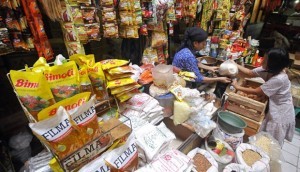A Number of Basic Commodities Exempted from VAT
 In order to give more legal certainty on types of basic commodities that really needed by the people which are exempted from Value Added Tax (VAT) and to harmonize Decision of Constitutional Court Number: 39/PUU-XIV/2016, on 15 August 2016, Minister of Finance Sri Mulyani Indrawati has signed Regulation of Minister of Finance Number 116/PMK.010/2017 on Basic Commodities Exempted from Value Added Tax (VAT).
In order to give more legal certainty on types of basic commodities that really needed by the people which are exempted from Value Added Tax (VAT) and to harmonize Decision of Constitutional Court Number: 39/PUU-XIV/2016, on 15 August 2016, Minister of Finance Sri Mulyani Indrawati has signed Regulation of Minister of Finance Number 116/PMK.010/2017 on Basic Commodities Exempted from Value Added Tax (VAT).
According to this Regulation, basic commodities which are very much needed by the people are the commodities that are needed for peoples daily life and become a factor that support peoples prosperity.
These commodities are: a. Rice and grain; b. Corn; c. Sago; d. Soy; e. Consumption salt; f. Meat; g. Eggs; h. Milk; i. Fruits; j. Vegetables; k. Tubers; l. Spices; and m. Consumption sugar.
The appendix of the Regulation mentioned that the basic commodities as well as their criteria that are exempted from VAT are: Rice and grain in the husk, hulled grain, half ground grain or fully ground grain, polished grain/not, cracked grain, fractions of rice coming out from grinding machine (menir), in addition to rice suitable for sowing.
Meanwhile point b. Corn includes peeled or unpeeled corn, shredded corn, cracked corn, and fractions of corn coming out from grinding machine (menir), but not include the seed of corn; c. Sago which criteria are: sago pith, flour, coarse flour and powder; d. Skinned soy, whole and cracked soy, besides the seed of soy.
Criteria for point e. Consumption salt, are iodized or non-iodized salt (including table salt and denaturated salt/ for consumption of peoples basic needs); point f. Meat, which criteria is fresh meat from livestock and poultry or unprocessed boneless meat; including chilled, frozen, salted, and acidified meat, meat that marinated in limestone water, or meat that preserved using other methods.
Criteria for point g. Eggs, are unprocessed eggs, including cleaned eggs, salted or preserved eggs.; h. Milk, including pasteurized and chilled milk, as well as unsweetened milk; i. Fruits, such as fresh picked fruits, that have been washed, sorted, peeled, cut, sliced, graded, beside dried fruits.
In the meantime, criteria for point j. Vegetables, are fresh picked vegetables that are washed, drained, frozen and/or kept in low temperature, including chopped fresh vegetables; k. Tubers, such as fresh tubers that have been washed, sorted, peeled, cut, sliced, and graded; l. Spices, including fresh and dried spices but are not crushed; and m. Consumption sugar, including white crystalline sugar from cane for consumption purpose without additional flavor or color.
This Minister Regulation shall apply after 30 (thirty) days as of the date of its enactment, Article 4 of the Regulation of Minister of Finance Number 116/PMK.010/2017 says, which has been promulgated by Directorate General of Law of the Ministry of Law and Human Rights Widodo Ekatjahjana. (JDIH Kemenkeu/ES)(MMB/YM/Naster)








